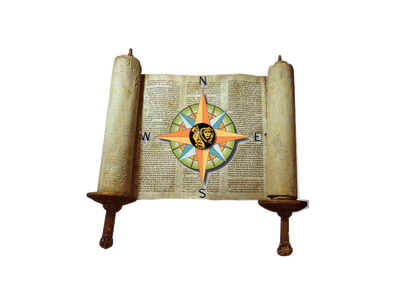A passage in the book of Samuel shows the Urim and Tumim in action. When King Saul believed that a member of the Israelite army had committed a sin that removed God's favor, he used the Tumim to discover who was at fault. The text says that Saul separated himself and his son Jonathan from the troops and used the Tumim to determine whether the fault was with Jonathan or the rest of the army. The Tumim showed that it was Jonathan who had sinned. He then confessed his actions (I Samuel 14:41).
The idea of using special objects as oracles to divine secret knowledge existed in many cultures of the ancient world. Think of the Urim and Tumim as a special pair of dice that a king or high priest could throw to determine a propitious date for attacking an enemy or discovering a source of divine disfavor. The Urim and Tumim were instruments of selection that helped their user discover meaning and sense in a world of seeming chaos and uncertainty.
In that respect, the Urim and Tumim are rather like the Torah itself. They were a guide to finding a right path in a world that seems to be all wilderness.
The lovely irony is that, during the very time of year when we read about the Urim and Tumim in the Torah, their exact counterpart appears in an upcoming holiday. Purim, of course, is the holiday named for pur, the selection tool used by the evil Haman to discover the date for the destruction of the Jews. The book of Esther tells how, "In the first month, the month of Nisan, in the twelfth year of King Achashveirosh, pur (which means 'the lot') was cast before Haman concerning every day and every month, until it fell on the twelfth month, the month of Adar" (Esther 3:7).
In the Purim story, Haman's use of the pur is a kind of inside joke. Haman is depicted as an evil and superstitious man who denies God. He believes in a universe without rules that is governed only by strength and power, not by ethics or righteous divinity. His reliance on the pur is a statement about his allegiance to a random universe.
The joke is that, when Haman casts the pur, the date revealed—seemingly by chance—is nearly the last possible day on the calendar. Nisan is the first month of the year; Adar is the last. Poor Haman cast his dice on New Years Day to find out when he would realize his dream. The dice landed on the equivalent of December 15th. Haman would have to wait eleven and a half months—plenty of time for his intended victims to discover his plan and prepare their defense.
The book of Esther, famously, is the only book of the Hebrew Bible that does not contain the name of God. Yet, God's presence is felt everywhere in it. God appears as the unnamed source of strange coincidences that show a higher power at work against the forces that worship only human might.
The relationship between the Urim and Tumim, on one side, and the pur, on the other, is paradoxical. Both appear to be instruments of random selection, but their meaning is opposite. Haman selected his date with a pur because he believed in chaos. A random selection device, according to this view, would reflect the nature of a random universe. The high priests and kings of Israel, on the other hand, used the Urim and Tumim because they believed in an underlying order hidden beneath the seeming disorder of reality. This device that freely chooses among options, to them, would have been like a compass that points to the true north of God's will, revealing the hidden pulse of God's magnetic field of meaning.
What do you believe? Do you, at a fundamental level, believe that there are reasons and purposes within the universe that usually are hidden beyond the reach of our senses? Or, do you believe that your presence in the world is just the product of a long series of meaningless coincidences? Either position can be defended, yet it is difficult to see how both can be true.
Shall you choose one or leave it to chance?
Other Posts on This Topic:
Tetzaveh: Keeping the Fire Burning
Ekev: Deuteronomy vs. Job






 RSS Feed
RSS Feed
